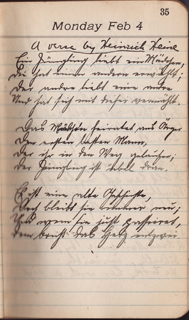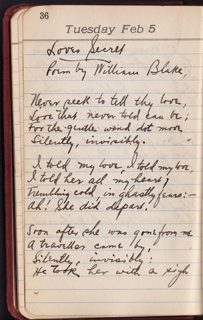 I’ve tried to make the
I’ve tried to make the
mass meeting a success
my efforts brought a big
crowd, the speakers were
brilliant and the Cantor was
wonderful but got only
a handfull of members.
I have worked it all single-
handed, but — I am not
discouraged, I will carry on
After the meeting I
spend a pleasant hour
at Shulem’s in the company
of Ab. Goldberg, Dr. Schechter
and Mr. Graf.
——————
Papa had been worried about the success of this meeting, which was meant to revive a flagging chapter of the Zionist Organization of America, for a while. He’d considered giving up on his efforts if the meeting wasn’t well attended, but I’m sure only the sight of a completely empty room would have punctured his idealism that decisively. (To chase a dream in New York is to deny its folly. So it always was, so it shall ever be.)
Papa passed his “pleasant hour” at Sholem’s with Abraham Goldberg who, as mentioned before, was a prominent member of the Z.O.A. I don’t know who Dr. Schechter and Mr. Graf were (for a brief moment I wondered if Dr. Schechter could have been Solomon Schechter himself, but since Solomon died in 1909 it would have been decidedly unpleasant, not to mention illegal, to spend an hour in his company).
It surprised me to read about the cantor’s presence at Papa’s meeting, but I know I really shouldn’t be. I also know I’m going to be surprised by this kind of thing again and again in the course of this project. I think it’s due to my own lack of spiritual attachment to Judaism (or anything else). While I’m aware of religion’s effects on people’s politics and daily lives, I know no more about what it’s like to be a person guided by spiritualism than I know what it’s like to be a dolphin guided by sonar. Papa was an observant, learned Jew, he saw himself as one of the Children of Israel and, accordingly, saw Zionism as a way home for himself and for everyone he loved. Zionism was an extension of his Judaism, so why wouldn’t he arrange for a cantor to sing at a Zionist meeting? But still…
If I seem to be struggling with something obvious, it’s because I’m so different from Papa in this way. It’s food for thought: Part of the reason I’m doing this project is to comprehend, as an adult, those qualities in Papa that seemed so transcendent to me as a child. But certainly Papa’s spiritual beliefs were greatly responsible for that transcendence, for the warmth he exuded, for keeping him intact throughout the trials of his youth. Whatever I find of him in myself, then, has at least some of its roots in spiritualism. Yet I’ve inherited only the effects, not the cause; spiritualism created what psychology perpetuated. Maybe it’s just another face of assimilation.
Update 1/28
I think there’s a parallel between the process of religious tradition giving way to inherited behavior and the evolution of the Jewish fraternal system, which I’ve talked about in other posts. The fraternal system provided a formal way to let immigrants cement their relationships, through ritual, on American soil with people from their original countries; they could take comfort in their old traditions while starting to build new ones. As the immigrant communities developed more home-grown support systems and found support in their new country’s agencies (labor unions, government services, etc.) the importance of ritual and fraternal bonding lessened. What older generations sought through the fraternal system — security, a sense of responsibility to others, a feeling of mutual support — remained, but in another form. Subsequent generations still pursued the qualitative equivalent of what their forbears taught them to value, only in different ways; what one generation pursued through ritual, another perpetuated through more secular means. Isn’t this a bit like what I was saying above about how my grandfather’s admirable qualities — his diligence, his respectful nature, his generosity — inspired by the spiritual side of Judaism, might make it to subsequent generations in the absence of religious belief?






